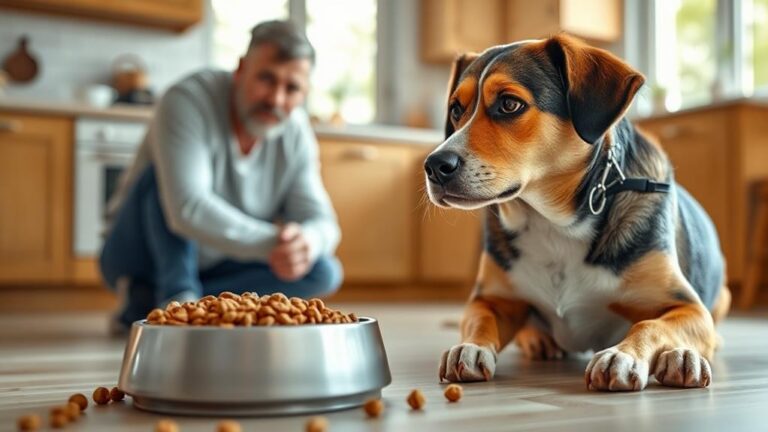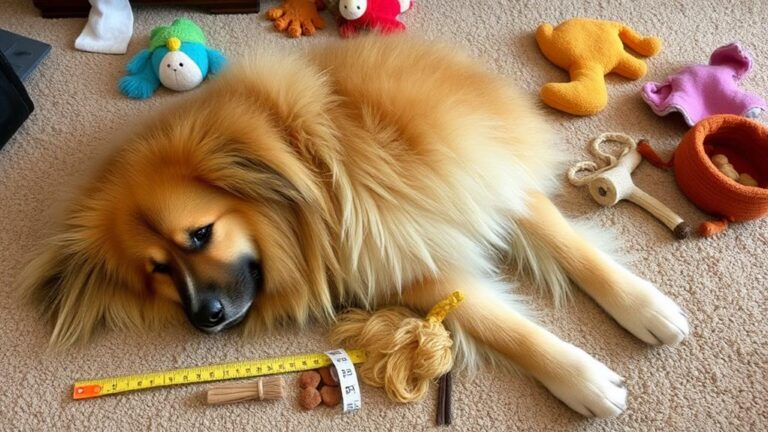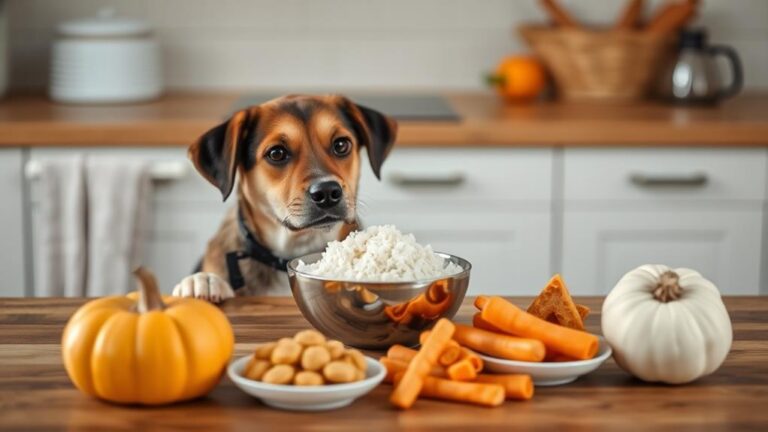If your dog doesn't chew his food, it can lead to choking, vomiting, and digestive issues. First, check for signs of stress or anxiety during mealtime. You might consider using slow feeder bowls or puzzle toys that make him work for his food. Offering smaller, more frequent meals can also help. If your dog's lack of chewing is sudden, consult a vet. It could signal underlying health problems. Addressing this quickly guarantees your dog's well-being. To better understand how to help, explore tips and solutions that can make mealtimes safer and more enjoyable.
Risks of Not Chewing Food
When your dog doesn't chew his food, it can lead to several serious risks. First, he might choke on large pieces. This can cause him to gag or cough, showing signs of distress.
If he swallows food too quickly, it can result in vomiting or regurgitation. Another major risk is gastric dilatation-volvulus, commonly known as bloat. This condition is life-threatening and requires immediate attention.
Additionally, unchewed food can create digestive complications. His stomach may struggle to break down the food properly, leading to discomfort and other health issues.
It's essential to monitor his eating habits closely. By understanding these risks, you can take steps to help guarantee your dog stays safe and healthy during mealtime.
Reasons for Fast Eating
Fast eating can stem from various reasons. Understanding these can help you address the issue effectively. Here are some common causes:
- Gorging Behavior: Some dogs eat quickly because they're used to gulping down food.
- Competition: If you have multiple pets, your dog might rush to eat before others get to the food.
- Instincts: Early puppyhood experiences can create a habit of fast eating.
- Anxiety or Stress: Mealtime might make your dog feel anxious, leading to quicker eating.
Recognizing these reasons can help you find the best approach for your dog.
It's important to guarantee they chew their food properly for better digestion and to avoid health risks.
Addressing Lack of Appetite
Lack of appetite in dogs can be concerning and often signals underlying issues.
First, watch for any symptoms that might need medical attention. Signs like vomiting, lethargy, or diarrhea should prompt a vet visit.
If your dog continues to refuse food, consult your veterinarian about force feeding options. Sometimes, tube feeding might be necessary if your dog won't eat at all.
It's important to guarantee your pet gets the right nutrition during this time. Assess their overall health too, as dental issues or other health problems can affect appetite.
By understanding the root cause, you can help your dog regain their appetite and maintain their health.
Don't hesitate to seek professional guidance when needed.
Solutions for Fast Eaters
If your dog gulps down food too quickly, it's important to find ways to slow them down. Here are some effective solutions:
- Use slow feeder bowls: These bowls have obstacles that make it harder for your dog to eat fast.
- Implement more frequent, smaller meals: This can help satisfy hunger without the need to rush.
- Introduce puzzle toys: These toys can dispense food slowly, keeping your dog engaged while eating.
- Incorporate obstacles in food bowls: Putting balls or stones in the bowl can make your dog navigate around them, slowing their pace.
Nutritional Considerations
Your dog's nutritional needs can change over time, and it's essential to adjust their diet accordingly.
Older dogs may need softer food due to dental issues. You might want to take into account safe treats, like bananas, which can provide health benefits.
Always monitor their water intake, especially if they're eating less. If your dog isn't chewing, they mightn't be getting enough nutrients.
You could also try appetite stimulants, like rotisserie chicken or specialized supplements, to encourage eating.
Be certain to consult your veterinarian if you notice any ongoing issues. They can help you find the best food options to meet your dog's changing dietary needs and guarantee their overall health.
Conclusion
To sum up, it's important to pay attention to your dog's eating habits. Fast eating can lead to serious risks and may indicate deeper issues. By understanding why your dog gulps down food, you can take steps to encourage better chewing and address any appetite concerns. Implementing the right solutions will not only make mealtime safer but also more enjoyable for your furry friend. Remember, a happy dog is a healthy dog!



